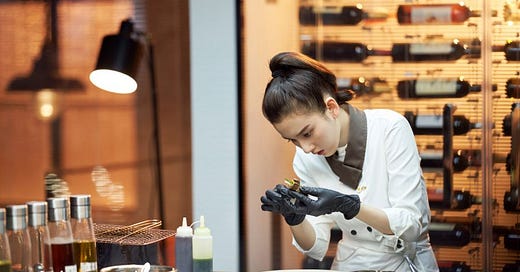
Stranger Season 2 (2020) Episodes 7-8
With the kidnapping of Dong-jae, the show has made a definitive shift at least in emphasis and pacing so there's a bit more clarity regarding where things are headed. As I've said I don't have problems with emphasizing the political side of things but I’m sure (judging from how well S1 was received) that there are better ways to get there. It is possible to have substance without sacrificing storytelling. I'm still not sure why there was such a marked shift in style this season... different people steering the ship perhaps... but if it ain't broke why fix it?
All that to say... Episodes 7-8 saw a marked improvement. A much needed injection of energy and intrigue which had been sorely lacking.
It’s heartening to see Si-mok and Yeo-jin working together again even if ultimately their goals don’t completely align due to their respective sides. In their own way, Si-mok most especially, they are finding their voices, articulating them within the context of a cacophony of perspectives. Undoubtedly, their kind of views are easily drowned out in a sea of pragmatism. It is important for them to assert themselves into the conversation even when it isn't convenient or when the leadership tries to shut them down. And there's plenty of reason... as we'll see ... for the leadership on both sides to prevent them from ruffling feathers.
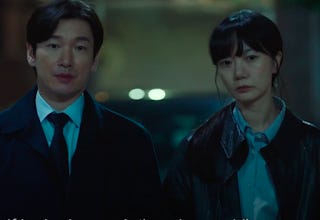
This is not to say that people of good-will with common goals can't have different ideas about the solutions are. Or even that people motivated by self-interest don't have good notions. It's certainly the case with Dong-jae. Although he was a rabid self-promoter and an inveterate networker, was diligent about the law. He had genuine concerns about his work-life balance which motivated all that bootlicking.
The conversation between Chief Kang and Si-mok about nepotism, cronyism in general and Assemblyman Nam more specifically is noteworthy in so far as it continues along this theme of the role of public servants/officials as representatives and upholders of our cherished institutions. That conversation and the one later between Woo Tae-ha and Choi Bit (who obviously know each other better than they let on initially) highlights to me how important it is that the general public be reassured that established institutions are working for the good of all and not just a select few. People need to know that the system is generally fair especially because life is hard. People need to know that having the right qualifications and working hard does get them somewhere. This kind of aspirational impulse is absolutely essential not just for individuals but it reaps innumerable benefits especially in innovation and agility in problem solving. It’s good for organisations and communities to have talented, capable people at the helm and at all levels. That’s why progressive societies discourage nepotism and cronyism because it is generally acknowledge that we want the best people for specific jobs regardless of who they know. Furthermore, one of the issues that arise from giving jobs to friends or relatives is the echo chamber effect. They are more agreeable and less likely to tell you things you need to hear rather than than what you want to hear. Chief Kang and the other more senior staff who have become cynical and jaded over time might believe that the system is broken and can’t be fixed. But that doesn’t inspire public confidence or boost the morale of those at the lower rungs of the public service ladder to believe that right behaviour is rewarded. Hence the vicious cycle continues. So what Chief Kang considers to be petty and trivial isn’t actually so in the long run. Turning a blind eye to unethical practices becomes a habit. Over time the habit becomes accepted behaviour. That is what Si-mok’s point is. It is the little things that tell you what’s really wrong systemically. Corruption doesn’t happen overnight. It is the accumulated effect of a whole range of things over time.
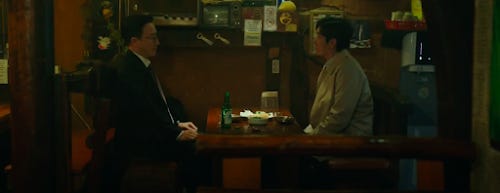
After Episode 8, the other half and I were both in agreement that the kidnapper is someone possibly related to the suicide cases that Dong-jae was looking into but the culprit is an unknown variable at this point. I speculate that this individual has some kind of long-term grievance against the criminal justice system … and Dong-jae possibly happened to be in the wrong place at the wrong time.
One thing's got my curious is the focus on Dong-jae's junior, Jung Min-ah. I wonder why. They brought her in to interrogate Team Leader Baek. She seems sharp and very much on top of things. The fact that she picked up on the Crime and Punishment reference is suggestive and it did take Si-mok by surprise. Maybe he was even a little impressed. I'm not sure if the subs I watched were accurate or if I understood what was being conveyed correctly but the pawnshop owner in Crime and Punishment was a woman.
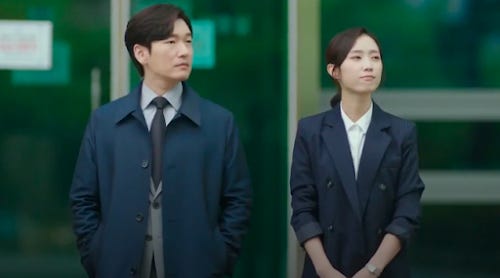
What I suspect the show is going for … after 6 episodes of information overload on steroids… after 6 weeks of wading through political mumbo jumbo and stats… is really one extensive and exhausting diatribe about the rot that is festering in the criminal justice system. Which seems like an obvious things to say considering this is a K drama. While the rot is most certainly a problem, the bigger problem is that no one wants to do anything about it. Except to band-aid the cracks as much as possible and reflexively practise damage control. All the bluster about reformation is more about power grabbing and gatekeeping. No one wants to actually do the heavy lifting of overhauling the system. Despite the whining and moaning, people prefer to maintain the status quo in some fashion because once everyone's mired in the rut it’s just easier to stay in it. It’s also hard for people to acknowledge that they’re part of the problem because they had to learn the rules of the games being played and have become enthusiastic participants in some cases. To me that’s Chief Kang’s problem. One of them at least. He’s not a bad person (no one really is) but he’s so entrenched in the system that he's locked into a kind of survival mode. That seems to be the case for most of the big people calling the shots. I'm sure he wants to pick his fights because it would be exhausting to be constantly putting out fires.
There is an expectation… and a trust… that the system should work if the right processes are in place and followed. But the truth is “the system” is made up of flawed individuals who operate almost entirely on self-interest. Abuse is bound to happen. That’s why we have accountability structures in place so that no one person can hold too much power. One of the problems that arises out of cronyism is that power does become concentrated in the hands of oligarchs or autocrats. Yes, a person like Si-mok could be very annoying because he questions everything. Like the 4 year old that keeps saying “why?”. But every organisation needs people like that to keep them on their toes. To keep everybody honest. To keep remind the people in the organization why they have a job and what that job is.
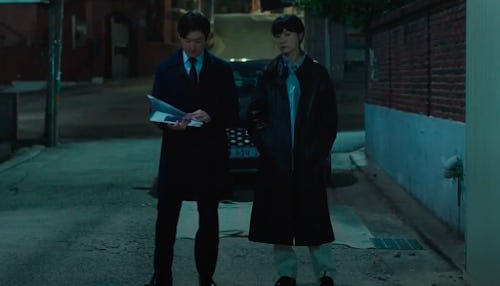
This is an expanded post of one I wrote for JangHaven Forums.







